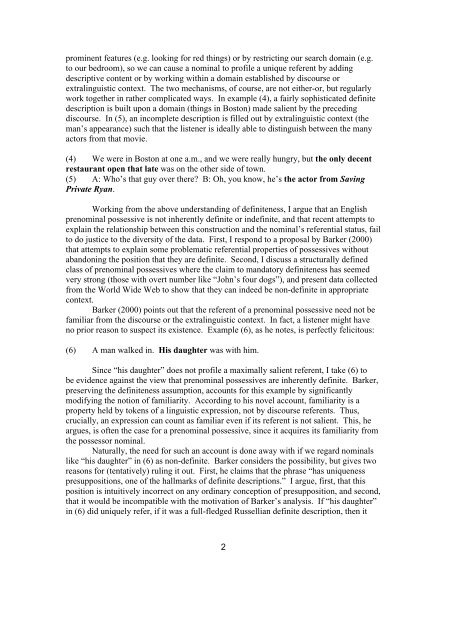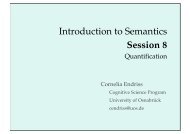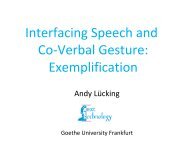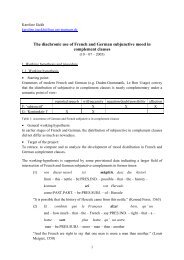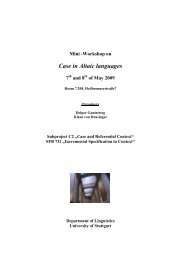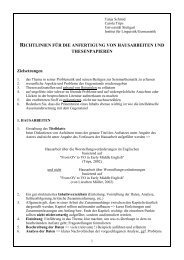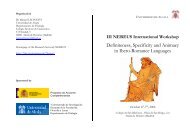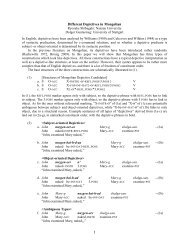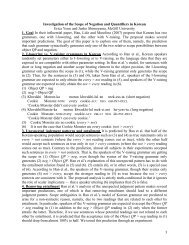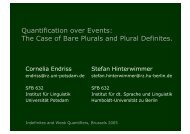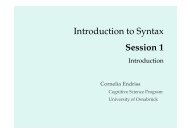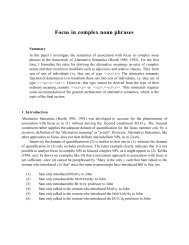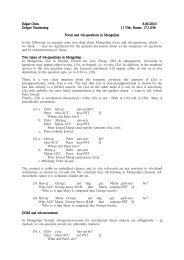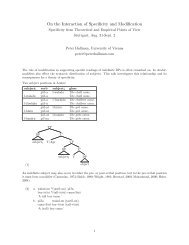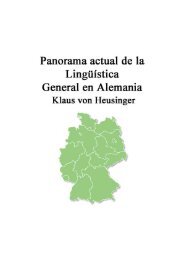SemPrag03.Progr.pdf - Institut für Linguistik/Germanistik - Universität ...
SemPrag03.Progr.pdf - Institut für Linguistik/Germanistik - Universität ...
SemPrag03.Progr.pdf - Institut für Linguistik/Germanistik - Universität ...
Create successful ePaper yourself
Turn your PDF publications into a flip-book with our unique Google optimized e-Paper software.
prominent features (e.g. looking for red things) or by restricting our search domain (e.g.<br />
to our bedroom), so we can cause a nominal to profile a unique referent by adding<br />
descriptive content or by working within a domain established by discourse or<br />
extralinguistic context. The two mechanisms, of course, are not either-or, but regularly<br />
work together in rather complicated ways. In example (4), a fairly sophisticated definite<br />
description is built upon a domain (things in Boston) made salient by the preceding<br />
discourse. In (5), an incomplete description is filled out by extralinguistic context (the<br />
man’s appearance) such that the listener is ideally able to distinguish between the many<br />
actors from that movie.<br />
(4) We were in Boston at one a.m., and we were really hungry, but the only decent<br />
restaurant open that late was on the other side of town.<br />
(5) A: Who’s that guy over there? B: Oh, you know, he’s the actor from Saving<br />
Private Ryan.<br />
Working from the above understanding of definiteness, I argue that an English<br />
prenominal possessive is not inherently definite or indefinite, and that recent attempts to<br />
explain the relationship between this construction and the nominal’s referential status, fail<br />
to do justice to the diversity of the data. First, I respond to a proposal by Barker (2000)<br />
that attempts to explain some problematic referential properties of possessives without<br />
abandoning the position that they are definite. Second, I discuss a structurally defined<br />
class of prenominal possessives where the claim to mandatory definiteness has seemed<br />
very strong (those with overt number like “John’s four dogs”), and present data collected<br />
from the World Wide Web to show that they can indeed be non-definite in appropriate<br />
context.<br />
Barker (2000) points out that the referent of a prenominal possessive need not be<br />
familiar from the discourse or the extralinguistic context. In fact, a listener might have<br />
no prior reason to suspect its existence. Example (6), as he notes, is perfectly felicitous:<br />
(6) A man walked in. His daughter was with him.<br />
Since “his daughter” does not profile a maximally salient referent, I take (6) to<br />
be evidence against the view that prenominal possessives are inherently definite. Barker,<br />
preserving the definiteness assumption, accounts for this example by significantly<br />
modifying the notion of familiarity. According to his novel account, familiarity is a<br />
property held by tokens of a linguistic expression, not by discourse referents. Thus,<br />
crucially, an expression can count as familiar even if its referent is not salient. This, he<br />
argues, is often the case for a prenominal possessive, since it acquires its familiarity from<br />
the possessor nominal.<br />
Naturally, the need for such an account is done away with if we regard nominals<br />
like “his daughter” in (6) as non-definite. Barker considers the possibility, but gives two<br />
reasons for (tentatively) ruling it out. First, he claims that the phrase “has uniqueness<br />
presuppositions, one of the hallmarks of definite descriptions.” I argue, first, that this<br />
position is intuitively incorrect on any ordinary conception of presupposition, and second,<br />
that it would be incompatible with the motivation of Barker’s analysis. If “his daughter”<br />
in (6) did uniquely refer, if it was a full-fledged Russellian definite description, then it<br />
2


